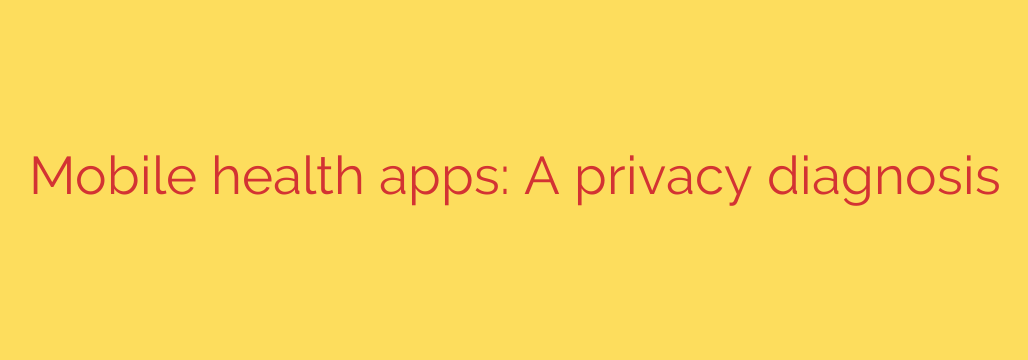
Your Health App Is Sharing Your Secrets: A Guide to Protecting Your Privacy
Mobile health and wellness apps have transformed how we manage our well-being. From tracking our daily steps and monitoring sleep patterns to managing chronic conditions and supporting mental health, these digital tools offer unprecedented convenience and insight. But as we feed them our most sensitive personal information, a critical question emerges: what happens to that data, and who else gets to see it?
The unfortunate reality is that many health apps have alarmingly poor privacy practices. While you’re tracking your health, they may be tracking you for purposes that have nothing to do with your wellness, such as targeted advertising and data brokering. Understanding the risks is the first step toward protecting your most personal information.
The Big Misconception: HIPAA Doesn’t Cover Most Health Apps
Many of us assume that our health data is protected by law. We often hear about HIPAA (the Health Insurance Portability and Accountability Act), the federal law that safeguards medical information handled by healthcare providers, hospitals, and insurance companies. However, this protection has a major blind spot.
Most direct-to-consumer health and wellness apps are not covered by HIPAA. When you voluntarily enter your data into a fitness tracker, diet log, or symptom checker, you are not engaging with a “covered entity” like your doctor. Instead, you are giving your data to a tech company, and the use of that data is governed by their privacy policy—a document few of us ever read. This legal loophole means app developers can often share or sell your data with far fewer restrictions.
Where Does Your Data Go? The Troubling Truth About Data Sharing
Once you grant an app access to your information, it can be sent to a surprising number of third parties without any further notification to you. Studies have found that a significant percentage of health apps routinely share user data.
The primary recipients of this information include:
- Advertisers and Marketers: If your app knows you struggle with sleep, you might start seeing ads for mattresses or sleep aids across the web. This is because data about your habits and conditions is packaged and sent to advertising platforms like Google and Facebook.
- Data Brokers: These are companies that exist solely to collect, analyze, and sell personal information. Your health profile can be bundled with other data points (like your location and shopping habits) to create a detailed consumer profile that is sold to the highest bidder.
- Analytics Services: App developers use these services to understand user behavior, but these platforms also collect vast amounts of data for their own purposes.
This data sharing often happens in the background through third-party trackers embedded within the app’s code. The app may function perfectly on the surface, all while your information is being quietly transmitted elsewhere.
Actionable Steps to Protect Your Personal Health Information
While the landscape can seem intimidating, you are not powerless. By becoming a more conscious user, you can significantly reduce your privacy risks and take control of your digital health footprint.
1. Scrutinize App Permissions
Before and after you install an app, carefully review the permissions it requests. Does a calorie counter really need access to your contact list? Does a meditation app need your precise location? Deny any permissions that are not absolutely essential for the app’s core function. Modern operating systems on both iOS and Android give you granular control over these settings.
2. Read the Privacy Policy (The Smart Way)
No one wants to read a 30-page legal document. Instead, use your browser’s “Find” feature (Ctrl+F or Cmd+F) to search for keywords like “share,” “third-party,” “advertising,” “partners,” and “data.” This will help you quickly find the sections that explain how your information is handled and with whom it is shared. If the language is vague or overly broad, consider it a red flag.
3. Limit the Data You Provide
Be mindful of the information you enter. Only provide what is necessary for the app to work. Avoid linking your social media accounts, and if possible, use an alias or a separate email address (a “burner” email) for signing up. The less data that can be directly tied to your primary identity, the better.
4. Choose Apps from Reputable Sources
Not all apps are created equal. Apps developed by non-profits, respected healthcare systems, or academic institutions often have stronger privacy protections than free, ad-supported apps. Look for apps that offer clear, transparent privacy controls and have a history of responsible data management.
5. Regularly Review and Purge
Periodically go through your phone and delete any health apps you no longer use. Remember, even if you’re not actively using an app, it may still hold your historical data. When you delete an app, check its website for instructions on how to request the permanent deletion of your account and associated data.
Your health is your most valuable asset, and the data that describes it deserves the highest level of protection. By staying informed and taking these proactive steps, you can continue to benefit from the power of health technology while safeguarding your fundamental right to privacy.
Source: https://www.helpnetsecurity.com/2025/10/15/mobile-healthcare-apps-security-and-privacy-problems/








